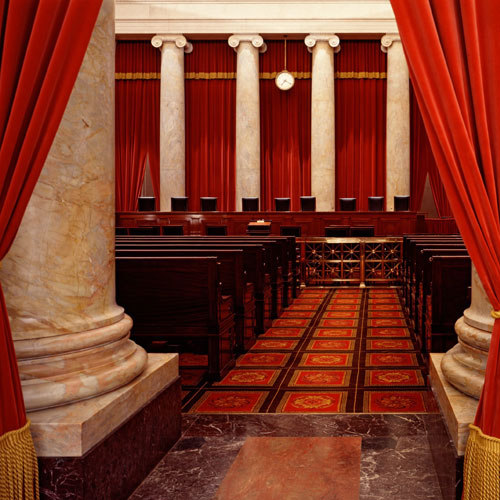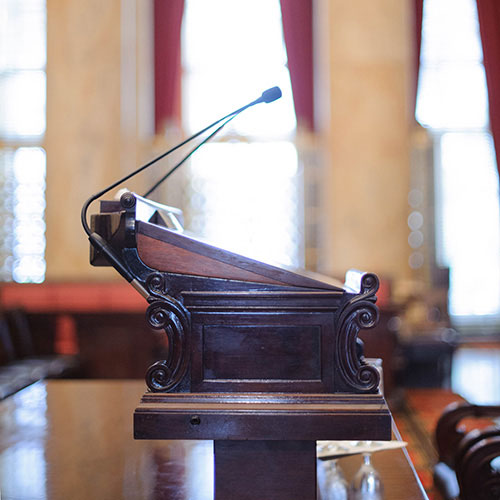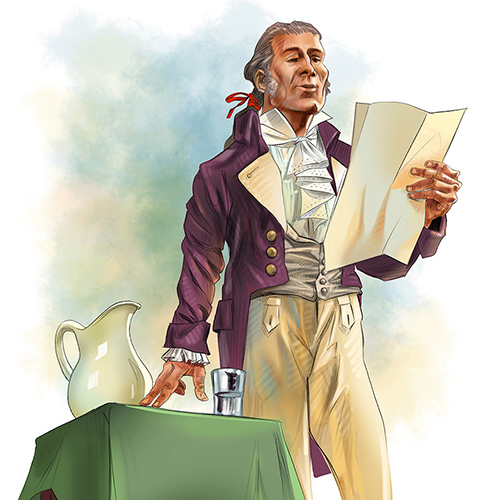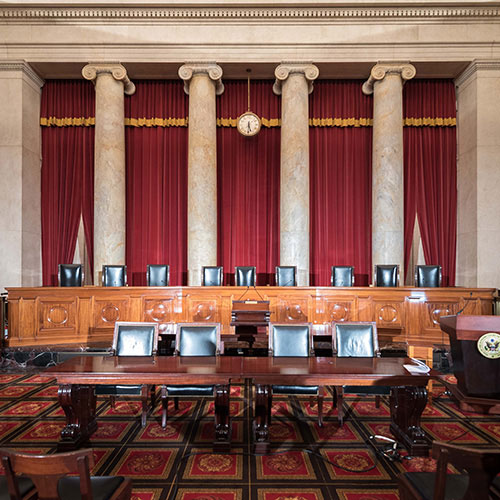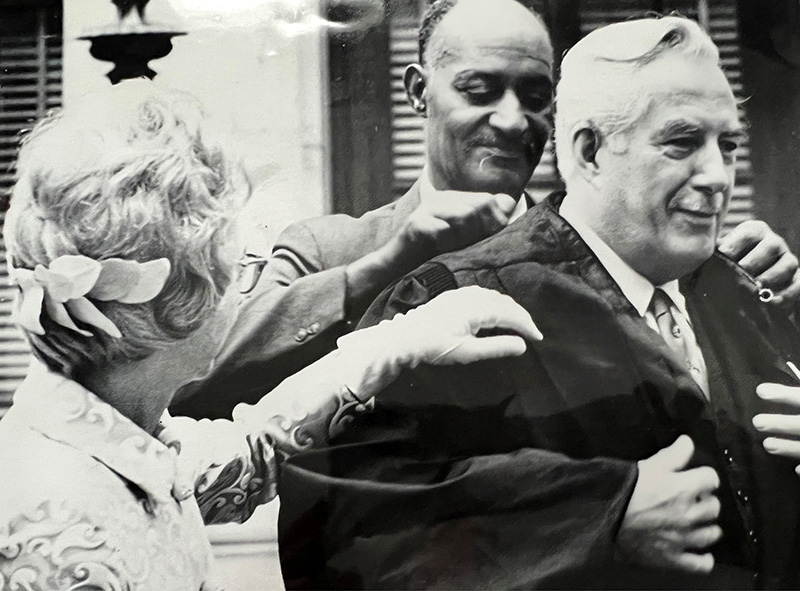
When Ketanji Brown Jackson was sworn in on June 30, it marked the end of an unusually long interval—about 12 weeks—between her Senate confirmation on April 7 and her oath-taking, as she waited for Stephen Breyer to finish out his duties for the Term. Most appointees receive their commissions days, not weeks, before a seat is vacated. Breyer had officially announced his retirement in January, unusually early. Previously, the longest interval was two weeks—when Earl Warren turned over the chief justiceship to Warren Burger on June 23, 1969. (Burger had been confirmed by the Senate on June 6.) The history of that transition merits revisiting, not for its timing–but because it marked the first time a sitting president addressed the Supreme Court in its Courtroom. The episode was also a high water mark for civility. Those in the Courtroom that day witnessed an extraordinary interchange between the Chief Justice and Chief Executive, who both put aside political feuding to speak about the role of the Supreme Court in a democracy.
Richard Nixon came to witness proudly the swearing-in of his appointee, Burger, but also to bid goodbye to Warren, with whom he had been fighting political battles since the 1940s. On different wings of the California GOP, they had developed a deep hatred for one another. Their enmity took on a national cast when Nixon ran for president in 1968. He made criticizing the Warren Court as being soft on criminals a cornerstone of his successful campaign. As president, Nixon could have chosen to keep interactions to a minimum with Warren, who had announced his retirement. Instead, he took the high road and was gracious. The reason for Nixon’s magnanimity on his visit to the Courtroom was the lucky break he had caught in having the opportunity to appoint a chief justice. Nixon was the beneficiary of the huge political miscalculation outgoing president Lyndon B. Johnson made in nominating Associate Justice Abe Fortas, his longtime friend and legal advisor, to succeed Warren.
The cascade of events that led to the coveted center chair being open for Nixon to fill began a year earlier. Predicting his fellow Californian would win the White House in November 1968, Warren had sent a formal note to Johnson on June 13 advising him of his intention to retire “effective at such a time as a successor is qualified.” Age 78, Warren had been on the Court for 15 years and was suffering from intermittent angina pain. Johnson publicly announced Warren’s departure on June 26 and nominated Fortas to be elevated to chief justice. However, despite the Democrats commanding 64-36 seat advantage in the Senate, the nomination failed. Fortas, who had taken his seat in October 1965, had continued to advise Johnson on policy matters and lied to the Senate about it. He had also accepted fees for university lectures from parties with business before the Court. Southern Democrats filibustered his nomination and Fortas asked the president to withdraw his name. Johnson, who was not running for a second term, did so on October 4. With the election so near, the lame duck president decided not to try to ram through an 11th hour nomination to the Supreme Court. Johnson released a statement: “Under the circumstances, the foundations of government would be better served by the present Chief Justice remaining until emotionalism subsides, reason and fairness prevail.”
After Nixon’s narrow November victory, he asked Warren to finish out the Term. The Chief Justice agreed, to prevent disruption of the Court’s work. Warren did consider rescinding his retirement letter but felt boxed in by having said he was too old to lead the Court. (Warren would regret not having stayed on. “If I had known what was going to happen to this country and this Court, I would never have resigned,” he told a reporter during the Watergate hearings. “They would have had to carry me out of there on a plank!”)
Nixon graciously decided to make the annual dinner for the Supreme Court at the White House into an event celebrating Warren. The black-tie affair in April, 1969 gathered 112 guests, including members of the Court, the Cabinet, Warren’s large family, and many friends. Nixon toasted Warren and thanked him for his 52 years of public service at the local, state and national level. In turn, Warren stood and said pointedly to the president, “I approach retirement with no malice toward anyone.” In a thank-you note, he told Nixon “it was the most thrilling social event of my half century of public life.”
Nixon continued to take the high road with Warren at the Court’s final session. He arrived by limo with his Secret Service entourage at 10 am. Nixon sat quietly in the back, listening to the Warren Court justices hand down the last three decisions of the Term. To show his respect, Nixon wore the traditional cutaways worn by government attorneys arguing cases. When he approached the podium to speak he opened his remarks with “Mr. Chief Justice and May It Please the Court” as if he was opening an oral argument. “I am honored to appear today, not as President of the United States but as a Member of the Bar admitted to practice before this Court,” he intoned. Facing him on the bench were Warren, Hugo L. Black, William O. Douglas, John M. Harlan, William J. Brennan, Potter Stewart, Byron R. White and Thurgood Marshall. (One seat was empty as Fortas had stepped down in May under a cloud of scandal, giving Nixon a second vacancy.) Few of the justices had been sitting the first time Nixon appeared in the Courtroom, on October 5, 1953, to move the admission of an attorney and a judge. Coincidentally, that day was Chief Justice Warren’s inaugural session on the bench and those admissions were the first matter he heard.
Nixon spoke for seven minutes at the podium. He began with a humorous recollection of his two oral arguments in Time Inc. v. Hill (1967). Looking humbly at his old foe Warren in the center chair, he joked: “I can say Mr. Chief Justice, that there is only one ordeal that is more challenging than a presidential press conference and that is to appear before the Supreme Court.” He then proceeded to praise Warren, saying he “always had the humanity which was all-encompassing, the dedication to his family, his personal family, to the great American family, to the family of man.” He expressed the nation’s gratitude “for that example of humanity which the Chief Justice has given to us and to the world.”
Nixon philosophized about continuity and change. He predicted a transition from a progressive Court to one that prized law and order, as he had promised during his presidential campaign:
Change without continuity can be anarchy. Change with continuity can mean progress. And continuity without change can mean no progress. As we look over the history of this Nation, we find that what has brought us here has been continuity with change. No institution of the three great institutions of our Government has been more responsible for that continuity with change than the Supreme Court of the United States.
Nixon then thanked Warren for exemplifying three “simple attributes” which are “more important than all of the controversy and necessary debate that goes on when there is change.” “[A]ll of us are grateful today [for Warren’s] example of dignity, the example of integrity, the example of fairness.” He concluded by saying “that this Nation owes a debt of gratitude to the Chief Justice of the United States for his example” of selflessness.
Warren thanked Nixon for his “generous” words and then proceeded to give a civics lecture on the Supreme Court’s role in a constitutional democracy. The veteran Chief Justice emphasized the theme of continuity as a counterpoint to Nixon’s theme of change. Warren stressed “how continuing” the Court is in developing “consistently the eternal principles of our Constitution in solving the problems of the day.” He emphasized that the justices serve the “public interest” and are “guided only by the Constitution and our own consciences. And conscience sometimes is a very severe taskmaster.” He also implied that differences of opinion make the Court stronger:
We do not always agree. I hope the Court will never agree on all things. If it ever agrees on all things, I am sure that its virility will have been sapped because it is composed of nine independent men who have no one to be responsible to except their own consciences. It is not likely ever, with human nature as it is, for nine men to agree always on the most important and controversial things of life. If it ever comes to such a pass, I would say that the Court will have lost its strength and will no longer be a real force in the affairs of our country. But so long as it is manned by men like those who have preceded us and by others like those who sit today, I have no fear of that ever happening.
Further, Warren concluded that despite their differences, he had “a feeling of deep friendship” for the men he served with. “In the last analysis, the fact we have often disagreed is not of great importance. The important thing is that every man will have given his best thought and consideration to the great problems that have confronted us.” Warren expressed no regret: “So I leave in a happy vein, Mr. President, and I wish my successor all the happiness and success in his years on the Court, which I hope will be many. You having issued a commission to him, it becomes my very happy duty and pleasure to administer the oath to him.”
Then the audience rose as the Marshal brought Burger forward to be sworn in. Warren delivered a combined Constitutional and judicial oath. Finally, Warren turned to the audience and said: “I present the new Chief Justice of the United States.” The old chief exited silently; a lack of applause was customary. The two chief justices retreated to a room to sign the oath officially. An emotional Warren told Burger he was profoundly touched by Nixon’s unexpectedly kind remarks.
